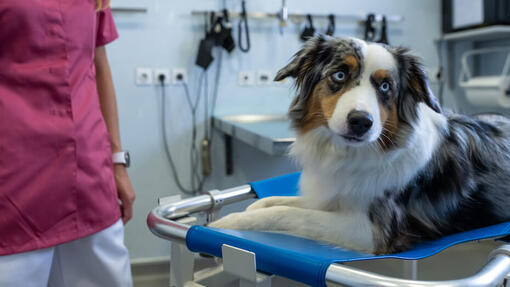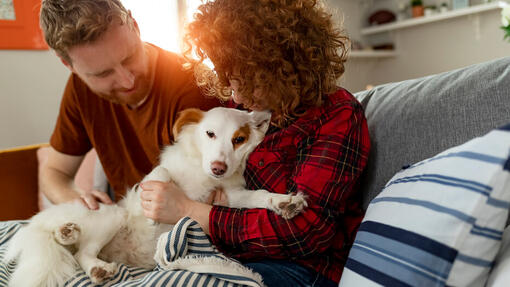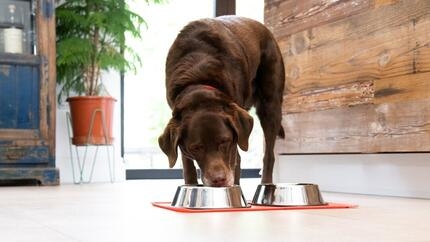
Dog miscarriage is a difficult experience for many pets and their owners. Even though we try our best to keep our furry friends healthy and happy, unforeseen complications can occur, and miscarriage is one of them. So if you’ve ever wondered: “can dogs have miscarriages?”, the answer is yes, they can and it’s important to know about them so that we can help.
Understanding the possible causes, signs, and treatments of dog miscarriage is key for prompt and effective vet care. Whether your dog has experienced a miscarriage in the past, or you want to be prepared if it happens, this article is for you. Read on to learn how you can support your dog through this challenging situation.
What is a dog miscarriage?
A dog miscarriage refers to the spontaneous death of one or more foetuses during any stage of the pregnancy. Depending on when it happens, your dog may have symptoms or it can go completely unnoticed.
If your dog miscarries in the early stages (about the first 45 days of pregnancy), it’s common for the embryo(s) to be reabsorbed into the body. At this stage it is not uncommon for the whole litter to be reabsorbed. Sometimes there’s no way to even know there was a pregnancy, unless your dog was previously checked by a vet.
On the other hand, if they miscarry later in the pregnancy (after 45 days), you’re likely to see stillborn pups, either born early or on your dog’s due date. Alternatively, a foetus may become mummified in the uterus, which could result in infection. Miscarrying at this stage is more likely to cause your dog discomfort than an early-stage miscarriage.
It’s also possible for one or more foetuses to be miscarried or reabsorbed and the others still be born. The successful delivery of the remaining puppies depends largely on the reason for the miscarriage and on the treatment provided by the vet.
Keep in mind that miscarriages are not very common among healthy dogs and even on the off chance that it happens, your dog should make a full recovery.
Signs of miscarriage in dogs
As previously mentioned, in the case of reabsorption you probably wouldn’t notice anything’s wrong with your furry friend. However, if the miscarriage happens in the later stages of the pregnancy, here are the signs you should be on the lookout for:
- Unusual vaginal discharge
- Abdominal pain
- Fever
- Lethargy or depression (refusal to eat, walk on the street or play at home, etc.)
- Contractions
- Dehydration because of reduced drinking and eating
Causes of dog miscarriage
When your dog’s miscarrying, it’s very important to find out the cause behind it. This can help with treatment and also prevent any future miscarriages. Check out some of the most common triggers of dog miscarriage:
- Infection, either parasitic, viral, or bacterial
- Hormonal shifts due to low levels of progesterone (the hormone needed for a healthy pregnancy)
- Nutritional deficiencies
- Foetal defects
- Genetic defects
- Traffic accidents, impacts or falls, etc. Even if no external injuries are observed, the female dog can suffer a miscarriage.
- Drugs or toxins. If you suspect that your dog is pregnant, it is crucial to avoid using certain drugs. You should make your vet aware before starting any new medications and discuss whether any ongoing medications are safe for use during pregnancy.
In some cases, you may not manage to identify a definitive cause of your dog’s miscarriage, but ruling out infections or nutritional deficiencies can be important for your dog’s health. Your veterinarian is the best person to check over your dog and discuss any further investigations and treatments. With effective treatment and supportive care, you can get your furry friend back to their healthy and happy old self.
How to treat a dog miscarriage
There are several steps to treating a miscarriage and for the best results, your vet will have to carry out some tests before deciding on a treatment.
First, they might need to do an ultrasound in order to find out if there are any viable foetuses left. They might also carry out some tests, on both the mother and the aborted foetus to see if there are any infectious causes. This could be done on either blood or the dog’s discharge.
If your vet suspects the reason might be low progesterone, they might also want to monitor your dog’s levels. If they’re low, it’s possible that your dog won’t be able to carry the pregnancy to full term, even if there are viable foetuses left. A C-section could also be performed in cases where continuing the pregnancy might risk the mother’s health, or where there’s a possibility of saving the remaining puppies.
It’s very common for the vet to recommend a course of intravenous fluids and antibiotics in case of an infection. However, if the tests point to a hormonal imbalance, progesterone supplements might be an option. Both of these scenarios require monitoring so your dog might need to spend a few days in the hospital.
Regardless of the reason for your dog’s miscarriage, it’s worth considering having your dog spayed. This would prevent any future pregnancies, and would also prevent serious infections like pyometra developing down the line. Neutering (both in males and females) has pros and cons in terms of health and behaviour, but in females it’s almost always the best option; if you’re not sure, your vet will be happy to discuss this with you.
Recovery of miscarriage in dogs
Your furry friend will need some extra care and affection following a miscarriage. Focus on spending time with her, either by playing together (with games adapted to her medical situation) or just cuddling. This will help improve her spirits and she will usually recover relatively quickly.
It’s key that your dog stays hydrated and gets proper nutrition. In the first days following the miscarriage, she might not be able to eat as much as before but this should quickly improve. Remember that good nutrition and proper rest are crucial for recovery. Feeding a complete dog food is best, but you can offer treats alongside this to help stimulate her appetite. You should also provide a very comfortable resting area. Some people think that their dog’s appetite will improve once they’ve recovered, but it’s important for them to eat well and rest in order to recover as soon as possible. If they’re not eating well, you should discuss this with your vet.
Make sure to also monitor her discharge daily and contact the vet if there’s anything unusual about it.
With proper care and attention, your dog should make a full recovery following a miscarriage. Give her time, patience, and love, and you can go on to enjoy lots of happiness and quality time together.
Check out this article on how to best look after new-born puppies next.








